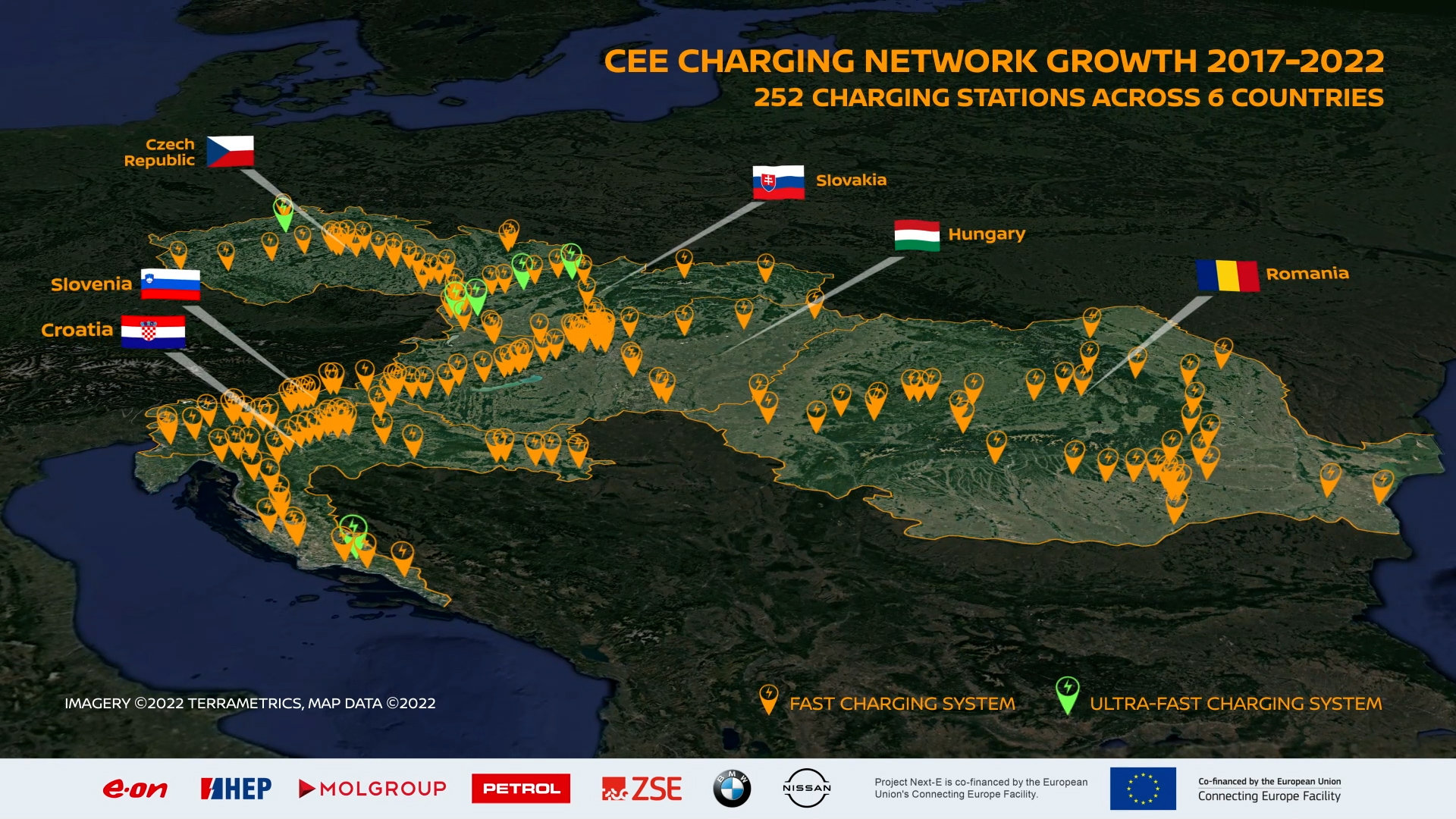
The NEXT-E consortium has installed a fully integrated and accessible charging infrastructure in the Czech Republic, Slovakia, Hungary, Slovenia, Croatia and Romania as part of the NEXT-E project. Over the past four years, Nissan has joined forces with ZSE, E.ON, HEP, PETROL, MOL Group and BMW to facilitate the widespread adoption of EVs by promoting electromobility.
In total, 222 multi-standard fast charging stations and 30 ultra-fast charging stations were installed. This creates the critical infrastructure needed to support the growing demand for electric vehicles and assist potential buyers in their transition to an electrified future. Sustainable charging solutions and renewable energy integration are part of Nissan's carbon neutral ambition. In addition, in the name of energy efficiency, Nissan and its joint venture partners have also adapted the charging stations specifically for customers' needs. The consortium adopted chargers with solar power generation and battery energy storage in locations where there was no fixed power supply. The introduction of roofed stations allowed the installation of solar photovoltaic panels at the stations, allowing for maximum utilization of space and greater economic efficiency.
The consortium also recognised that customers require flexible payment methods and increased accessibility. The NEXT-E charging infrastructure is based on widely accepted payment options, including digital payment methods, subscriptions for customers on a monthly plan, payment cards and contactless features.
Further emphasising the innovation behind this collaboration, the project was then awarded the largest e-mobility grant by the European Commission. From the Connecting Europe Facility (CEF) programme for electric vehicle projects, NEXT-E received a recommended co-funding of €18.84 million.
To support the adoption of electric vehicle use in the region, the project identified the most strategic and cost-effective approaches to infrastructure reform and service development. This effort has since connected pan-European regions and provided a seamless, comfortable, long-distance driving experience based 100% on electricity. NEXT-E has enriched the existing network in the project countries and created new "electrified" transport corridors for a coherent EV roadmap.
"The Next-E project is closely aligned with our intention to work with other key industry players for a cleaner, safer and more inclusive future. We are very pleased to see this project fully completed, 'electrifying' our customers' journey to Central Eastern European countries. We are committed to increasing accessibility to electric vehicles and have set out our long-term vision for mobility and beyond in Ambition 2030. With this, we plan to deliver superior value by enhancing travel and society through exciting, electric vehicles and technological innovations," noted Friederike Kienitz, Senior Vice President, Sustainability, Corporate Governance, Legal, External Affairs and Communications, Nissan AMIEO.
Electrification is one of the key elements in smart city planning with electric vehicles seamlessly integrated into the transport system. Charging stations are the main source of energy for EVs and their locations are critical for their accessibility. Nissan continues to work closely with industry leaders and government agencies to increase accessibility and create a global ecosystem for mobility and beyond by deploying tachy-chargers on key European motorways.
In Greece, Nissan Nick. I. Theocharakis S.A., faithful to its commitment to environmental protection and strengthening its environmental footprint, proceeds to another new phase of its strategic plan. A new project that starts immediately and is expected to be completed by the end of the year, will involve the expansion of its photovoltaic complexes, with additional solar panels at its facilities in Athens, promoting and enhancing environmental awareness as an integral part of its culture. By expanding its investment in photovoltaic panels, the company will cover a percentage that will now reach 80% of its existing energy needs (from 70% currently) and with the ultimate goal of full energy coverage.






